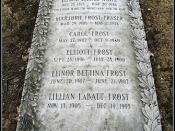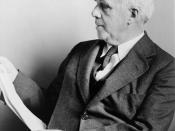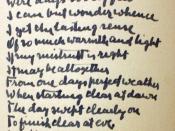A Biographical Look at the Poems of Robert Frost:Saying One Thing and Meaning AnotherThe one common thread that stitches together all poems is an author. A unique individual that pairs meaning with strings of words to create a story or message. Sometimes the meaning is blatant and other times it can be very elusive. Peering into an author's story can help reveal or drive out intention on the page. Robert Frost is one the greatest American poets of our time and one of the greatest at hiding meaning in his poems. He used poetry as an outlet for his grief as death seemed to plagued Frost throughout his life. Frost never explains his poems but does give the reader a reason for his approach:Poetry provides the one permissible way of saying one thing and meaning another. People say, "Why don't you say what you mean?" We never do that, do we, being all of us too much poets.
We like to talk in parables and in hints and in indirections-whether from diffidence of some other instinct. (Frost qtd. in Meyer 848)Frost used metaphors and symbols to purge his feelings on paper rather than just stating his thoughts. If the reader knows about the author's life, he or she will more fully understand the author's work (Meyer 1540). He wrote about nature, and death, and how they are connected. He wrote about the inspiration of nature's beginning and the crude reality of nature's end. He wrote about himself in a way in which his readers could relate. His simplistic writing style disguised deeper meanings. Frost focused on the detached way nature handles death, as part of a cycle and not as a tragedy. Robert Frost's inability to deal with death influenced the use of nature in almost of his works.
On March 26, 1874, Robert Lee Frost was added to the family that Isabelle Moodie Frost and William Prescott Frost, Jr. had started in San Francisco, California. William Frost was an alcoholic and it put strain on the family but the pain from his father's death when Robert was eleven was still great. The death of his father resulted in young Frost, his sister Jeanie and his mother moving to his father's hometown of Lawrence, Massachusetts. This was the city where Frost was home-schooled and raised solely by his mother. This explains his obsessive closeness to his family. When Frost reached the end of high school, he graduated at the top of his class as a co-valedictorian with his future wife, Elinor White. However, dropping out of both Dartmouth College and Harvard University, Frost failed to graduate from either college (Kennedy and Gioia).
The death of Robert Frost's father, William Preston Frost, Jr. was not the last of the tragedies in Frost's life. There were many more to come. After marrying Elinor White, the newlyweds had their first child and whom they named Elliot. Unfortunately, at three years of age, Elliot died of cholera on July 8, 1900 which left Robert and Elinor severely depressed. To add salt to their wounds, Frost's mother died November 2nd of the same year after a battle with cancer. The death of Isabelle was traumatizing to Frost as he became very attached to his mother after her years of raising him by herself. The next year, Robert Frost's grandfather died on July 10 and left his grandson the use of his farm in Derry, New Hampshire for ten years and which inevitably led to Frost's ownership of the farm. Over the next few years, Elinor gave birth to four daughters, whom she named Lesley, Irma, Marjorie, and Elinor Bettina respectively and a second son, Carol (Merriman). However, three days after Elinor Bettina's birth, she passed on June 21, 1907. Once again, Frost and his wife were torn apart by the death of another child. This death was almost more heart-wrenching the death of their first child because it happened so close to the joyous event of the child's birth. While all these deaths were occurring, Robert Frost was trying to pursue his career in poetry (Kennedy and Gioia).
In 1912, Frost sold his farm and moved to England with his wife and four children. He published a collection of poems named A Boy's Will at the age of 39. Some of the most memorable poems were "Mending Wall", "The Death of the Hired Man", "Home Burial", "A Servant to Servants", "After Apple-Picking", and "The Wood-Pile". Frost used his poetry to deal with the death of his wife, parents, grandfather, and four of his young children. Frost's recurring losses and loneliness played a pivotal role in the writing of his first published book. In 1920, Frost settled in on a rustic spread of farmland in South Shaftesbury, Vermont. Death continued to prey on those Frost loved most as his sister, Jeanie was taken from him and then his wife, Elinor died of a heart attack. Two of his daughters suffered mental breakdowns, and his son Carol, a frustrated poet and farmer, committed suicide and favored daughter, Marjorie died during childbirth (Merriman). Frost also suffered from depression and the continual self-doubt led him to cling to the desire to be awarded the Nobel Prize for literature (Kennedy and Gioia). Over his lifetime, he buried his wife, sister, parents and outlived four of his children.
One poem that portrays Frost's use of nature to deal with death is "Nothing Gold Can Stay". This poem is a controlled metaphor, which Meyer states is a comparison used throughout the entire poem (669), about a plant that has sprouted and turns into a flower. However, after a while it begins to fade away like all the other plants around it. Eventually, the plant dies. The first two lines read, "Nature's first green is gold/Her hardest hue to hold" (Frost 1-2). These first lines explain that new things, such as the spark of a relationship or a birth, are always of value to people. However, this new feeling is difficult to keep. The third and fourth lines read, "Her early leaf's a flower/But only so an hour" (Frost 3-4). These lines restate what the first two say. New things are beautiful but the beauty can be easily swept away. The next two lines are, "Then leaf subsides to leaf/So Eden sank to grief" (Frost 5-6). Now the poem turns so a more crude, realistic tone. Those two lines explain that the significance, beauty, etc. is lost and people mourn the loss. Finally, the last two lines read, "So dawn goes down to day/Nothing gold can stay" (Frost 7-8). The poem ends with a depressing tone, unlike the inspiring tone in the beginning, and states the moral of the poem and life. The last two lines mean that nothing good is going to be around forever. Clearly, Frost uses this poem to describe his life at that point in time: depressing and pessimistic. The theme of the poem is the last line and the title of the poem. It is a sort of moral to the poem and story of the plant's transitory life. "Nothing Gold Can Stay" means that nothing lasts forever and this moral is always cleverly hidden by it's early beauty, significance, value, etc.
No doubt influenced by the thousands of apple trees planted by his son, Carol, on the farm Frost gave him in Vermont, the poem, "After Apple-Picking", is a long metaphor for the moments closest to the end of life. Another reoccurring theme in Frost's poems is his view of how short life is. The poem begins with a man on a ladder climbing towards heaven but he has not had all the time he needs to accomplish the things in his life he wanted to get done.
And there's a barrel that I didn't fillBeside it, and there may be two or threeApples I didn't pick upon some bough.
But I am done with apple-picking now. (Frost qtd. in Meyer 858)The man's life was the apple-picking and even though there are still barrels to fill and apples left on limbs, he must be finished and it is not his choice. He is drowsing off (dying) but he can still smell the apples (life). As he is falling asleep, different apples come in and out of focus (memories). Frost feels dying must be like going to sleep and you dream the whole time about the things you loved most about life. Frost probably needs to maintain this view to soothe his mind about how awful the death of his loved ones must have been. The tone of the poem, defined by Meyer as the writer's attitude towards the subject (619), is that death or the ending of apple-picking is a relief for the man who is overtired from picking his apples. The words in the poem make death a beautiful release and it is comforting to Frost to paint the end of life this way.
A fat, white spider allows Frost to consider life's plan in his poem, "Design". How did it come about that the white spider, the white flower and the white moth all meet at that moment in time? The last sestet really dives into all the things that had to align to make this situation possible:What had that flower to do with being white,?The wayside blue and innocent heal-all??What brought the kindred spider to that height,?Then steered the white moth thither in the night?What but design of darkness to appall?--?If design govern in a thing so small.
Frost asks if life even had a plan for all three characters involved. Does life bother to design a set of circumstances for things so insignificant as a spider, a flower and a moth? What Frost is really asking is if life is controlled or fated. Was it his destiny to suffer so much and for those around him to die so tragically and some so young? Frost uses a controlled metaphor of an incident commonly found in nature throughout the poem. Using nature which is beautiful must make it easier for him to speak about the horrible events in his life that would otherwise stay trapped inside him.
The connection between the poems and Frost view of life is undeniable. Frost saw death all around him and views life to be incredibly brief. He grew tired of grieving and began to break down. Frost could not express his feelings about the death of his sons or daughters or even his wife verbally. He could however, use nature as a metaphor and through poetry he dealt with the immense, constant grief. He picked nature, out of all things, because nature showed no emotion towards death the way he never could. Unlike humans, nature did not grieve over the death of something close to it. Unlike humans, nature accepted death as an inevitability and understood the cycle of life. This was something that Frost could use to express himself in a hidden, indirect manner.
Robert Frost was one of the most influential and inspirational poets in American history. His poetry was easy to the eyes, ears, and mind. Frost uses death in mother nature to represent death in human nature. He does this to cope with the fact that he cannot bring himself to write about the death of his close family members. In his poem "Nothing Gold Can Stay", Robert Frost takes a simple life of an ordinary flower and, with the help from literary devices and simple language, turns it into all the lives he has lost in his. When the apple-picking is done in, "After Apple-Picking," sleep is welcomed and pleasant even though unexpected, the way death in reality could never be. Frost ponders life's design in "Design" to try to ration why things happen even within nature. Incontrovertibly, Frost's failure to be able to express his true feelings of life and death led to the use of metaphoric nature in his poetry.
Works CitedKennedy, X.J., and Dana Gioia. "Biography: Robert Frost." Literature: an Introduction to Fiction, Poetry, and Drama. 11 Apr. 2007 .
Merriman, C.D. "Robert Frost." The Literature Network. Jalic Inc. 12 Apr. 2007 .
Meyer, Michael. The Compact Bedford Introduction to Literature. 7th ed. Boston: Bedford/St. Martin's, 2006. 1-1674.


